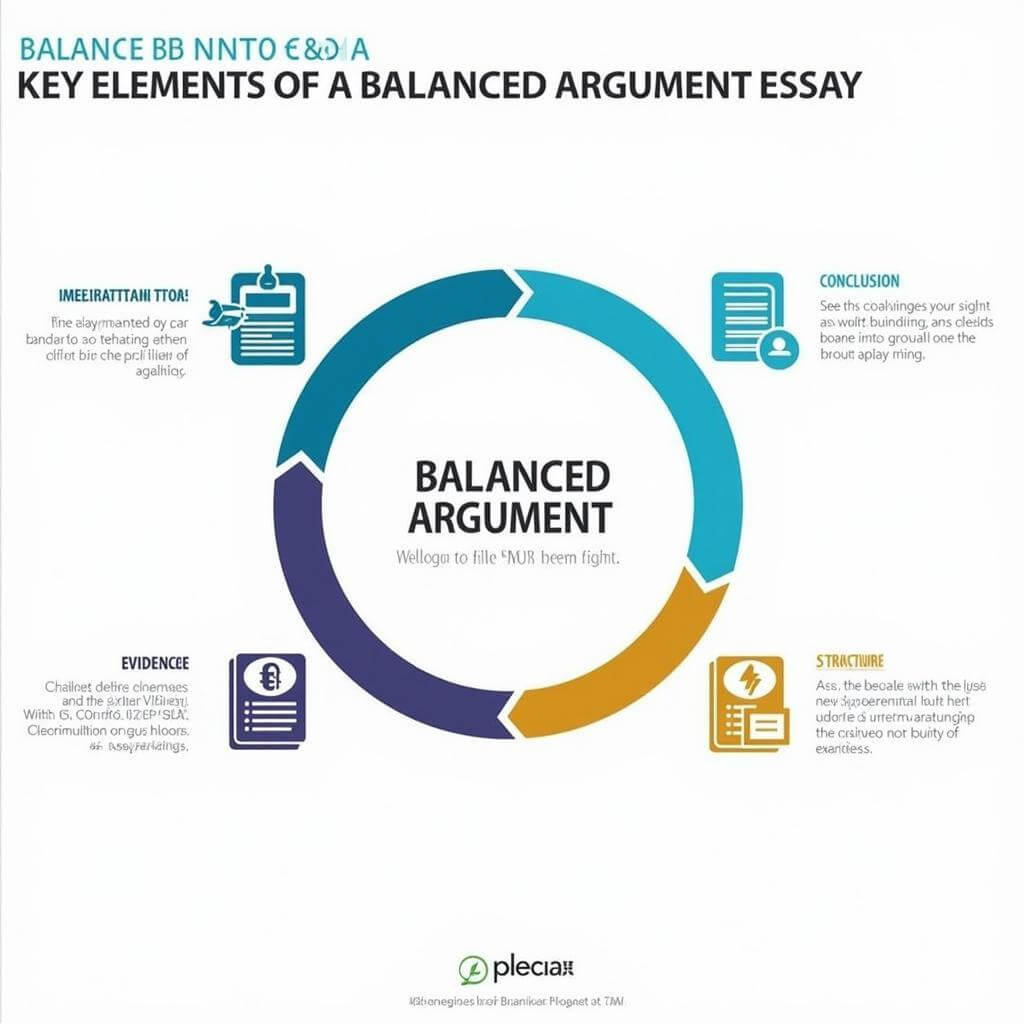Writing a balanced argument essay for IELTS Task 2 is a crucial skill that can significantly impact your overall Writing score. This comprehensive guide will walk you through the process of crafting a well-structured, coherent, and impartial argument that meets the examiners’ expectations.
Understanding the Balanced Argument Essay
A balanced argument essay requires you to present and discuss both sides of an issue before reaching a conclusion. This type of essay demonstrates your ability to critically analyze a topic and showcases your language skills in presenting contrasting viewpoints.
Key Elements of a Balanced Argument
- Impartiality: Present both sides without bias
- Evidence: Support each viewpoint with examples or reasons
- Structure: Organize your ideas logically
- Conclusion: Summarize and provide your opinion based on the evidence

Step-by-Step Guide to Writing a Balanced Argument
Follow these steps to craft a compelling balanced argument essay for IELTS Task 2:
- Analyze the question
- Plan your essay structure
- Write a clear introduction
- Develop body paragraphs
- Craft a strong conclusion
Let’s delve into each step in detail.
1. Analyze the Question
Carefully read the prompt and identify the key elements:
- Topic: What is the main issue being discussed?
- Task: What are you being asked to do? (e.g., discuss both views, give your opinion)
- Scope: Are there any specific aspects you need to focus on?
Pro Tip: Underline key words in the question to ensure you address all parts of the task.
2. Plan Your Essay Structure
Before you start writing, create a quick outline:
- Introduction: Paraphrase the question and state your overall approach
- Body Paragraph 1: First viewpoint with supporting evidence
- Body Paragraph 2: Second viewpoint with supporting evidence
- Conclusion: Summarize main points and give your opinion
How to enhance coherence in IELTS writing is crucial for a well-structured essay. Ensure your ideas flow logically from one paragraph to the next.
3. Write a Clear Introduction
Your introduction should:
- Paraphrase the question to show understanding
- Provide a brief overview of the issue
- State your intention to discuss both sides of the argument
Example:
“The question of whether governments should invest in space exploration or focus on solving problems on Earth is a contentious issue. This essay will examine both perspectives before reaching a conclusion.”
4. Develop Body Paragraphs
Each body paragraph should focus on one viewpoint:
- Start with a clear topic sentence
- Provide 2-3 supporting points or examples
- Use appropriate linking words to enhance coherence
Handling multiple viewpoints confidently is essential for a balanced argument. Ensure you give equal weight to both sides of the issue.
Example body paragraph structure:
- Topic sentence: “Proponents of space exploration argue that it leads to technological advancements.”
- Supporting point 1: “Many everyday technologies, such as GPS and weather forecasting, originated from space research.”
- Supporting point 2: “Space exploration inspires scientific innovation and attracts young people to STEM fields.”
- Linking sentence: “However, critics argue that these benefits do not justify the enormous costs involved.”
5. Craft a Strong Conclusion
Your conclusion should:
- Summarize the main points from both perspectives
- State your own opinion based on the evidence presented
- Avoid introducing new ideas
How to write better conclusions in IELTS essays can help you end your essay on a strong note.
Example:
“While space exploration has led to significant technological advancements, the pressing issues on Earth cannot be ignored. In my opinion, a balanced approach is necessary, with governments allocating resources to both space research and solving terrestrial problems.”
Tips for Writing an Effective Balanced Argument
- Use a range of linking words to improve coherence (e.g., however, nevertheless, on the other hand)
- Employ a variety of grammatical structures to showcase your language skills
- Use specific examples to support your points
- Maintain a formal tone throughout the essay
- Practice time management to ensure you can complete the essay within the given time
Effective brainstorming techniques for IELTS essays can help you generate ideas quickly and efficiently during the exam.
Common Pitfalls to Avoid
- Don’t present your personal opinion until the conclusion
- Avoid using emotional language or extreme statements
- Don’t neglect to provide evidence for both viewpoints
- Ensure your conclusion is consistent with the arguments presented
As IELTS expert Dr. Jane Smith notes, “The key to a successful balanced argument is presenting both sides impartially and supporting your points with concrete examples. This demonstrates critical thinking and analytical skills, which are highly valued by examiners.”
Practice Makes Perfect
Writing a balanced argument for IELTS Task 2 requires practice and refinement. Regular practice will help you:
- Improve your essay structure
- Enhance your ability to generate ideas quickly
- Develop your time management skills
- Expand your vocabulary and range of expressions
How to approach opinion essays in IELTS writing task 2 can provide additional insights that are applicable to balanced argument essays as well.
Remember, the goal is not just to present two sides of an argument, but to do so in a way that showcases your language skills and critical thinking abilities. With consistent practice and attention to the tips provided in this guide, you’ll be well-equipped to tackle balanced argument essays in your IELTS Writing Task 2.
By following this comprehensive guide and incorporating these strategies into your IELTS preparation, you’ll be well on your way to mastering the art of writing balanced arguments for IELTS Task 2. Remember, consistency and practice are key to improving your writing skills and achieving your desired IELTS score.